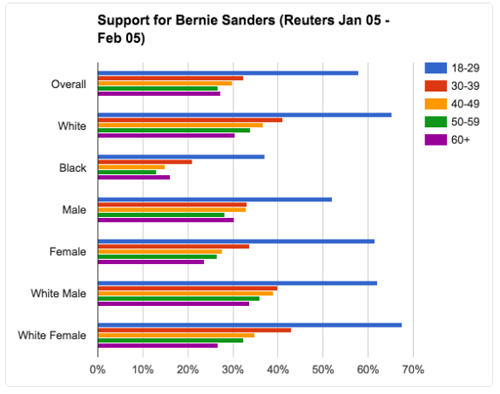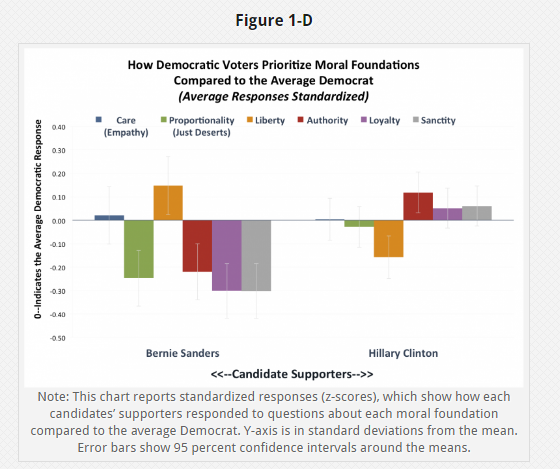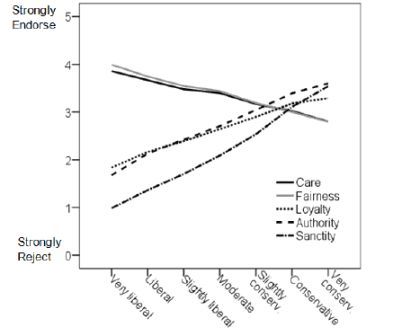John Kasich is supposed to be dropping out of the race any minute, which means Donald Trump will be the Republican nominee. There is no reasonable way for the Republican establishment to choose someone else now, however much they may want to.
(Just to show how screwed the Republicans are, see John French argue in National Review that Trump really isn’t a better choice for President than Clinton. Or, at least, one is as bad as the other. In National Review, mind you.)
The irony is that people had been predicting a contested convention for the GOP, but it looks as if it’s the Dems who will not have an official nominee when the gavel opens their convention. However, I have no doubt Clinton will have the nomination in the first round of voting, barring some unforeseen catastrophe that causes a massive shift in public opinion between now and then. Possibly even that wouldn’t change much.
But I want to get to the question nobody asks. Here it is not being asked by Josh Marshall — someone wrote to him, saying,
I’m a little late to the party on the Sanders comments, but I think one additional perspective on the current state of affairs is missing: Sanders’ entire campaign was made possible by the fact that Hillary essentially cleared the playing field for him prior to the primary season getting started. O’Malley was never a serious contender, which left the entire “not-Hillary†space to Sanders. Given all of the Democrats out there that have misgivings about her (you included), the default vehicle for channeling their disenchantment was to feel the Bern.
To which Josh replied,
As TPM Reader JR noted in his last email, a big part of Sanders success was based on the face that Clinton so effectively cleared the field of other candidates. Once it was just the two of them, he was going to do pretty well. But that doesn’t explain the scope of his victories. Some of this is just the left-wing of the Democratic party which is always there. But the heavy weight of young voters supporting Sanders is a genuinely new thing under the sun. Sanders has managed to garner a huge amount of support for a range of policies and basic perspectives about market economies that would have seemed anathema to most Democrats or at least politically fatal only a few years ago.
I agree with this, yet the question was not asked — how did Hillary clear the field prior to the primary season getting started?
We know some of it was Debbie Wasserman-Schultz denying exposure to the challengers by scheduling few pre-primary debates and putting those on at weird times no one would be watching. The Hillary Victory Fund scam also has the effect of corrupting the primary process by making 33 state Democratic parties (even though they are being screwed now) and the DNC financially dependent on a successful Clinton campaign. But the bigger question nobody asks is how did Hillary become the only establishment candidate?
Think about it. It’s been obvious for four years — eight, really — that there would be an open seat in the White House in 2016. And it’s been obvious for about that long that the Republicans were not going to have a reasonably challenging candidate. Given that every politician in Washington must at least occasionally fantasize about being POTUS, how come the only candidates to step up and challenge Hillary Clinton were outsiders?
Doesn’t that strike you as odd?
The only time a non-incumbent Democrat has had so little presidential primary competition in my memory was 2000, when the only serious challenger to Al Gore was Bill Bradley. I don’t remember asking the question then, either, but the Dems seemed at tad demoralized at the time. I could understand not wanting to run against an aggressive and organized Right. But there’s no reason for them to be demoralized now.
There’s a big sentiment out there that this year was Hillary Clinton’s turn. But how did that happen? In 2000 Al Gore was the sitting vice president, and sitting vice presidents are often assumed to be POTUS candidates unless the POTUS really screws up.
It might have been argued that it is now Joe Biden’s turn, which he chose not to take. But I don’t see a logical argument that a former Secretary of State gets a turn.
I looked it up. The last former Secretary of State who was elected president was James Buchanan. That was 160 years ago. Buchanan was a really awful President, but perhaps that had nothing to do with his being a former Secretary of State.
So, how did it get to be Hillary Clinton’s turn?
There’s been kind of a whispering campaign that’s been going on since 2000 that someday Hillary Clinton would be POTUS, and that the only reason she ran for Senator was to make it a springboard for running to the White House. And the whisperers — in politics and in media – have been saying she’s the inevitable candidate ever since. And I guess a lot of people just bought into that; you hear something often enough, it gets to be Revealed Truth. I don’t see any other earthly reason for such widespread public acceptance of her almighty inevitability.
And here we are. I agree with Josh Marshall’s letter that a lot of the support that coalesced around Sanders initially was anti-Clinton sentiment — he seemed to be the strongest candidate who was Not Hillary. I also agree with Josh that Sanders turned out to be a lot more than the not-Clinton candidate; people really warmed to his positions. He has been calling out loud for things that Democrats dared not hope for just a short time ago.
More conservative and pro-establishment Democrats have frantically been waving the visage of Trump at us to get us into line. And I think a lot of people bought that, too. Hillary seems to be the safer candidate against a slate of right-wing crazies, so we’d better vote for her in the primaries or we’ll get Donald Trump. This writer says she knows people who voted for Clinton only for that reason, even though they sorta kinda preferred Bernie. If Trump had not been the nominee, Clinton and the Dems would have been in trouble. But now that he is they may be secretly relieved.
But had Clinton not been the only establishment Democrat in the race, I don’t think she would have had a chance to sell herself as the Trump-slayer. Any establishment Dem would have done as well. Certainly Joe Biden also would have been a credible threat to Trump. John Kerry is the current Secretary of State and would have been a respectable, if not terribly interesting, candidate.
One of the jobs of a party is to identify and promote good candidates for office so that they are well known, and well thought of, before the elections begin. But this is something the current Democratic Party does not do well at all, and not just at the presidential level. They suck at identifying and supporting congressional and state-level candidates also. It’s why the Republicans run things.
Reason magazine was asking a year ago where are all the Democratic presidential candidates? “Vox.com claims Clinton remains the only serious potential candidate on the Democrat side because she’s ‘crushing the opposition.’ Or she could be sucking all the air out of the room, preventing anyone else from lighting a match,” this article says.
What opposition? Ezra Klein wrote in March 2015:
Jonathan Bernstein and Reihan Salam have written two smart articles on the Democratic presidential primary — or lack thereof — that are best read in tandem. Bernstein’s article is meant to explain why it looks like Democrats don’t have a bench even though they do, and Salam’s article is meant to show who’s sitting on it.
Bernstein’s argument is related to the “invisible primary” theory of presidential elections. Hillary Clinton, he says, “has earned the support of the bulk of Democratic party actors, and gained the acquiescence of other Democrats who aren’t as enthusiastic about her.” The result is that the Democratic Party’s “perfectly viable other candidates either dropped out or never seriously considered the race.”
Perhaps a slightly clearer way to put it is this: in the invisible primary, when the contest is as much a draft as it is a campaign, Clinton is “opposed” by essentially every Democrat fit for the presidency. If the party’s powerbrokers didn’t want to support Clinton and instead really wanted Sen. Michael Bennet to run, or Gov. Andrew Cuomo to lead the field, they would be working toward that outcome. Instead, they’re lining up behind Clinton. In this telling, Clinton isn’t winning by default. She’s winning by winning. The absence of competition is the product of Clinton’s strong, successful campaign to win over Democratic Party elites.
Ezra also had polls saying that people viewed her favorably, but polls that far ahead of an actual election make very bad predictors of anything, I understand. The fact that so many people seized upon the only remotely viable not-Hillary candidate tells us something that those polls missed.
Jonathan Bernstein actually wrote in March 2015,
Clinton has (apparently) won the nomination fair and square, through hard work and political talent.
Get that — she won the nomination fair and square months before the primaries began.
That is why she has earned the support of the bulk of Democratic party actors, and gained the acquiescence of other Democrats who aren’t as enthusiastic about her.
So all those perfectly viable other candidates either dropped out or never seriously considered the race. Had Clinton chosen not to run, plenty of the others would have jumped in, and the field would have been comparable to what the Republicans have put together.
When Clinton has a bad week — and during a multiyear campaign, everyone has bad weeks — pundits will look around for something or someone to blame. But there are going to be many weeks in the next year when Republicans are squabbling, and commentators are going to talk about how lucky the Democrats are for avoiding a contested primary.
Ha. Shows what you know, Jonathan Bernstein.
The problem is, of course. that Democratic Party elites have their heads up their ass and are largely insulated from the issues a lot of us are facing. Thomas Frank — and I don’t always agree with Thomas Frank, but I do here — writes of the Democratic Party establishment,
Cool contentment is the governing emotion in these circles. What they have in mind for 2016 is what we might call a campaign of militant complacency. They are dissociated from the mood of the nation, and they do not care.
I mean this in ways both great and small. The party’s leadership is largely drawn from a satisfied cohort that has done quite well in the aftermath of the Great Recession. They’ve got a good thing going. Convinced that the country’s ongoing demographic shifts will bring Democratic victory for years to come, they seem to believe the party’s candidates need do nothing differently to harvest future electoral bumper crops. The seeds are already planted. All that is required is patience.
Hillary Clinton is more or less openly offering herself as the complacency candidate. The least inspiring frontrunner in many years, she is a dynastic heir who stands to receive the Democratic nomination largely because it’s her turn – the logic that made Bob Dole the GOP leader in 1996. … Clinton’s unofficial slogan, “America never stopped being great†— supposedly a searing riposte to Trump’s “make America great again†– sounds like the kind of thing you’d see inscribed in a country club logo. In her words, we can hear the call of contentment, a would-be catchphrase for a generation of satisfied people.
Andrew O’Hehir has been arguing for months that both parties are splitting apart; it’s just happening more slowly on the Democratic side. The Democratic elite thought they were being smart by putting all their eggs in one basket, so to speak. Instead of giving a platform to a slate of candidates, the party tried to give us a single prepackaged candidate. This would have been a bigger marketing fiasco than New Coke were it not for the fact that the Republicans were imploding.
If Hillary Clinton becomes the next POTUS, she’ll have Donald Trump to thank.
Meanwhile, the young progressive folks who are the Dem Party’s hope are convinced that the Dems are hopelessly corrupt, that they rigged the primaries in favor of Clinton, and that neither party has anything to offer them. Way to go, DNC.



